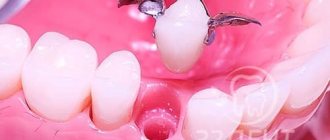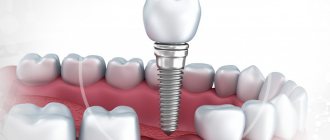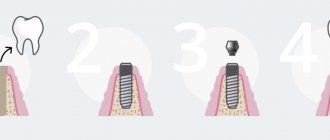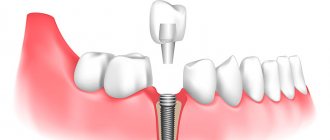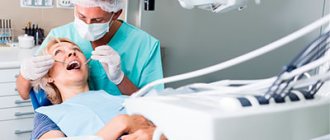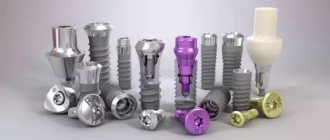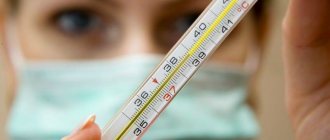Publication date: March 17, 2021
Tooth extraction or extraction is a surgical procedure that inevitably damages the gums. Swelling after surgery is a natural phenomenon, but there are situations when swelling warns of complications.
Gum healing proceeds normally if:
- slight swelling and swelling of the cheeks, disappear within 2-3 days;
- elevated temperature, passes in the same time frame;
Minor pain is also possible after the anesthesia wears off.
It is clear that discomfort when biting remains for up to 10-12 days, but in general, rehabilitation is characterized by positive dynamics.
Reasons why the cheek swells after tooth extraction
After tooth extraction, an inflammatory process occurs in the soft tissues of the oral cavity - this is the main cause of edema and swelling. If the operation is performed correctly and the patient has followed all the dentist’s recommendations, the non-infectious inflammation will go away on its own, without antibiotics or complications, and along with it, pain and swelling will go away.
The duration of swelling varies depending on the surgical technique, which tooth was removed, the condition of the oral cavity, and finally, the physical condition of the patient and his immune system. On average, swelling lasts 3-4 days, but can last for 7 days. If after a week the swelling has not subsided, this is a sign of the development of complications and a reason to consult a specialist.
Swelling appears a few hours after surgery (after the anesthesia wears off). At the same time, the patient may feel aching pain, and ichor is released from the wound. A slight increase in temperature is allowed. All these symptoms are considered natural and do not pose any danger. And to relieve pain, you can take painkillers analgesics.
Maximum swelling is recorded on days 3-4, from this moment it begins to decrease and by the seventh day it completely disappears. But the cheek can swell immediately after depulpation; this happens if the patient had gumboil and the tumor developed even before the operation.
How to relieve cheek swelling after dental treatment?
In order to relieve pain in the tooth, gum and cheek after treatment, as well as relieve swelling, DD Clinic specialists recommend their patients to do simple procedures at home.
- Rinsing the mouth with an antiseptic, which will be prescribed by the attending doctor depending on the cause of the swelling;
- In case of an allergic reaction, take antihistamines, such as tavegil, suprastin, Erius, etc.;
- In case of infectious inflammation of the cheek, take antibiotics. Here it should be recalled that medications should be used only those recommended by your doctor.
When you have a toothache or need a preventative examination, come to DD Clinic - our specialists will painlessly solve any dental problems.
Cheek swelling during wisdom tooth removal
Extraction of extreme molars (wisdom teeth) is considered one of the most difficult tooth extraction operations. It is accompanied by an incision of soft tissues and suturing, so inflammation after it is inevitable. Swelling after wisdom teeth removal lasts longer and is accompanied by pain.
Moreover, an elevated temperature may persist for several days, the patient may have difficulty swallowing, and experience pain when opening the mouth and during speech.
In this case, there is a risk of infection and serious inflammation, therefore, after depulping the extreme molars, it is necessary to take antibiotics and rinse the mouth with antiseptic solutions.
Treatment of inflammation of the oral mucosa
If your gums hurt under your denture, the first thing you need to do is consult with your dentist, who will determine the cause of the problem. Treatment should be based on diagnostic results, since only in this case will it be possible to completely stop the process and prevent complications. The patient must strictly adhere to the doctor's recommendations and should not self-medicate.
If the inflammation is caused by an uncomfortable design of the prosthesis, the doctor will make a correction, which will relieve the discomfort and then the inflammatory process. Sometimes one correction may not be enough, since the patient cannot always point out all the points where the prosthesis rubs. The doctor may also recommend special means to reduce the discomfort that often occurs in the early stages of wearing removable structures . For minor soft tissue injuries, the use of antiseptic agents is sufficient. This could be rinsing with herbal decoctions such as chamomile, calendula or St. John's wort.
If the cause of the complication is the manufacture of a low-quality crown, these measures will be clearly insufficient, the prosthesis should be replaced with a better one. The allergic factor of inflammation after dental prosthetics is eliminated by choosing a different type of prosthesis. Instead of plastic crowns, you should choose cast metal or metal-ceramic structures. An alternative to acrylic removable products is the more modern nylon ones.
We should not forget about maintaining hygiene. Mandatory cleaning should be done twice a day, in addition, after each meal you need to use special rinsing products. To remove plaque, you need to use regular brushes, floss, and brushes. Compliance with all the doctor’s recommendations is a guarantee that the prosthetics will be durable and not cause discomfort.
Date of publication: September 20, 2020 Last update: September 22, 2022 © 2020 Professorial Dentistry “22 Century”. All rights reserved.
Other causes of cheek swelling
Along with natural, so-called non-infectious inflammation, there are other causes of cheek swelling:
- tooth extraction due to gumboil;
- extraction with complications - in case of incorrect inclination or direction of tooth growth, when removing massive teeth and teeth with long roots;
- the presence of infection and inflammation in soft tissues;
- allergic reaction to medications or anesthesia;
- individual intolerance to components in medications or anesthetics;
- errors during extraction, insufficient antiseptic treatment of the oral cavity and residual infection;
- the presence of chronic diseases – hypertension, neuralgia, psycho-emotional pathologies;
- failure by the patient to comply with the recommendations of the dental surgeon, refusal of prescribed antibiotics or reduction of their dosage.
Most often, the tumor is caused by improper oral care, lack of disinfection with antiseptics, and skipping medications.
Causes of swelling of facial tissues after surgery
In response to injury, lymph flow to the injured area typically increases. This leads to the accumulation of fluid in the area of the operation, which externally looks like an increase in the volume of a certain area of the body. The gums, cheek, and chin may swell to varying degrees after installation of the implant. And here the most important thing is not the fact of tissue swelling, but how many days the swelling lasts after tooth implantation.
Normally, swelling increases gradually and reaches its peak by the third day after installation of the implant. A person may feel tension in this area, pain, and psychological discomfort. The listed phenomena disappear by the end of the first week or earlier, but with the help of special means the swelling can be removed faster.
Possible complications
If after seven days the tumor not only has not gone away, but has also grown and become denser, this indicates a progressive inflammatory process.
At the same time, other symptoms may appear: pain in the gums and cheeks (aching, cutting, throbbing), redness of the cheeks and gums, fever, weakness, loss of appetite, headache.
What complications can inflammation lead to:
- Alveolitis or “dry socket” - after a tooth is removed, a blood clot forms in the resulting socket. It serves as a protection and barrier to bacteria and protects the wound from infection. If it is somehow removed, the soft tissues are left without protection, pathogenic bacteria penetrate into them and suppuration begins. In advanced cases, inflammation spreads to other areas of the jaw; not only the cheek, but also the cheekbones and even the eye area swell.
- If, in addition to the tumor, the patient experiences severe pain in the jaw, this may indicate the development of osteomyelitis - inflammation of the bone tissue. The swelling on the cheek grows, spreading to the cheekbones and other parts of the face, the pain spreads to both jaws, the patient experiences pain when opening the mouth. If you do not consult a specialist in time, the disease can lead to blood poisoning.
- A gum abscess is a purulent inflammation inside the gum tissue. It is dangerous due to the spread of inflammation to other tissues, loosening and loss of teeth.
- Periostitis of the jaw (flux) is an inflammation of the jaw, characterized by increased temperature and severe pain in the jaw and temporal part. If left untreated, the flux can spread to the infraorbital area. In chronic form it can develop into osteomyelitis.
- Neuritis is damage to the facial nerve, accompanied by severe pain and swelling. A distinctive symptom is swelling of the larynx, palate, tongue, and cheeks.
Each of these complications can cause serious consequences, which is why it is so important to diagnose and treat in a timely manner.
Lip frenuloplasty
Another operation that requires surgical intervention is plastic surgery of the frenulum of the upper lip. It is carried out on the recommendation of an orthodontist (for example, if the patient needs to correct the bite in the future using a plate or braces) or a speech therapist (if the frenulum interferes with articulation).
The labial frenulum is responsible for additional attachment of the upper or lower lip to the jaw bones. Most often the upper frenulum undergoes surgery. This operation does not take long and does not have any negative physiological or aesthetic impact on the patient’s health and appearance.
Rules of care after frenuloplasty
If you have undergone this minor operation, then you need to know about the rules of oral care for the first time after the operation.
Two to three hours after the operation, you can apply cold to the lip. It is strictly forbidden to consume hot food on the day of the operation. Brushing your teeth in the next 24 hours is also undesirable, as is rinsing your mouth. Every other day, you can rinse your mouth with chamomile infusion.
Avoid contact of the operated surface with the tongue and dirty hands. Do not touch the wound. If you feel itching and burning at the operated site, you can take a pain reliever. But remember that taking aspirin is strictly prohibited, since it affects blood clotting.
How to eliminate cheek swelling
It is impossible to completely remove the tumor until the inflammatory process stops, but you can reduce it and minimize discomfort and pain. This can be done with ice and cold compresses. You need to apply a compress every half hour, but no longer than 10-15 minutes, otherwise it can cause hypothermia and tissue necrosis.
In addition, you can drink painkillers, analgesics, take baths and rinses with an antiseptic solution. Take antibiotics if prescribed by your doctor. This will eliminate the infection and speed up tissue healing.
In general, swelling of the cheek is a normal phenomenon if it occurs a couple of hours after tooth extraction and goes away no later than the seventh day after it. In all other cases, immediate specialist consultation, diagnosis and treatment are required.
How to reduce swelling after implantation
The main thing you need to do after implantation is to rest well and expect the outcome to be favorable. Your doctor performed the operation successfully, so now how the rehabilitation period goes depends only on you. Read our useful guide after dental implantation, which details what you need to prepare at home in advance and how to solve any problems that arise.
How to apply compresses? This is the most basic method that allows you to relieve tissue swelling. It is especially effective in the first day and even in the first hours after installation of implants.
Proceed as follows: use ice, a heating pad with ice water, or any food from the freezer. But don't overdo it, i.e. do not cause frostbite and tissue necrosis. The procedure is as follows: wrap ice in a towel or 2-3 layers of gauze/thin fabric, apply to the cheek on the side of the surgical intervention, hold for 5-10 minutes. The duration of the compress is 5-10 minutes, breaks are 3-5 minutes. The number of approaches is 7-10 times, for approximately 1.5-2 hours. Such courses can be repeated periodically during the first day.
How to eat properly to avoid swelling? In addition to solid foods (for any implantation protocols, even if the prosthesis was installed immediately), you must exclude excessively hot, spicy and salty foods, coffee, and spices from your diet. Caffeine, for example, increases blood pressure, which contributes to an even greater rush of blood to the head and, accordingly, increased tissue swelling.
Hot foods and drinks are prohibited, as they can lead to increased swelling. Hard - because they can injure the operated area and displace the installed implants. All of the above restrictions are in effect for a week.
Andrey Nikolaevich, 45 years old
“The operation went quickly for me, under anesthesia. I went home fully conscious and without much pain. I expected that when the anesthesia wore off, the pain would be unbearable, there would be severe swelling... Having covered myself with the recommended pills, I waited while I made compresses. The tablets were bought in vain. At night I slept as usual. In the morning I also didn’t experience anything special, there was almost no swelling. On the evening of the first day I came for my first fitting. On the third day, the prosthesis was installed - everything went perfectly!”
“If the doctor is a professional, then rehabilitation will take place very quickly, without pain and without swelling. Tested for myself! "
watch a video with the patient
How should you sleep after implantation? It is necessary to ensure the outflow of blood from the head; it is better to sleep with your head elevated. You can place several pillows under or on the mattress, thus increasing the angle of inclination. Many patients note that after surgery there is a feeling of pulsation in the head. Such a measure will also relieve such a symptom.
Is it possible to visit swimming pools and saunas? To relieve swelling, you need cold. Therefore, not only saunas and swimming pools are prohibited in the first week after installation of implants, but also long stays in a hot bath. It is better to limit yourself to a warm shower.
What medications will help against tissue swelling? After installation of the implants, the patient is prescribed drug therapy. We deliberately do not indicate the names of medications, because in each specific case medications are prescribed individually. But the complex necessarily contains anti-inflammatory and antihistamine drugs, which help reduce tissue swelling. Patients who have problems with the heart and blood vessels, high blood pressure, are also recommended to take appropriate medications.
On the 3rd day after implantation, the patient is scheduled for a preventive examination: the doctor will assess the condition of the tissues, the dynamics of healing and give the necessary recommendations. If you have doubts earlier, you should not wait for a scheduled visit; you can see a doctor earlier.
What else can be done to relieve swelling?
Additional measures can also help reduce swelling after implantation:
- Drug therapy. Take antibacterial, antihistamine, non-steroidal anti-inflammatory drugs prescribed by your doctor.
- Antiseptic baths. The dentist may prescribe rinses with chlorhexidine, chamomile decoction and other means to prevent inflammation and associated tissue swelling.
- Sleep with your upper body elevated. You can use several pillows for this. In this position, conditions are created for the outflow of fluid from the surgical area.
- Elimination of irritating factors. In the first days after installation of the implant, avoid eating hot, salty, spicy foods, coffee, and alcohol-containing drinks.
- Elimination of temperature changes. You cannot take hot baths or steam.
- Reducing overloads. In the first weeks, give up sports training, and also try to avoid stress.

